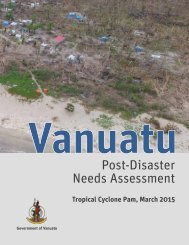Fiji
yqgk302EGjo
yqgk302EGjo
Create successful ePaper yourself
Turn your PDF publications into a flip-book with our unique Google optimized e-Paper software.
FIJI Post-Disaster Needs Assessment<br />
trees to be replanted and begin producing again, and for fisheries catch to recover after fish return to coral reef areas. Thus,<br />
rural household income and livelihoods are expected to remain depressed over a long period of time. Households may<br />
need: support and food assistance for a longer period of time; to further diversify their activities; or retraining for other skills<br />
so other income-generating activities can be undertaken. In addition, retraining in non-traditional and non-farm economies<br />
would increase the resilience of women and girls against future disasters.<br />
Subsistence agriculture is an important form of employment and income support for rural communities. The extensive<br />
damage sustained by, and projected reduced agricultural output across, the sector will not only impact the economic<br />
performance of the country but also has welfare implications on a large number of rural households. It will affect households’<br />
ability to provide food security, nutrition and meet familial basic needs, resulting in economic hardship and eroded resilience<br />
to future shocks.<br />
From a gender perspective and in economic terms, men overall have sustained the largest damage and production losses<br />
through the combined impact on the agriculture sector. Women hold a 33 percent share of the sector, 53 representing<br />
approximately F$179 million of the total agricultural damage and losses. However, women’s losses have far reaching<br />
implications at the household level as their subsistence activities and earnings contribute directly to nutritional security<br />
and household economic welfare and foster human welfare. Reduced yield in food crops, and the potential for resulting<br />
food insecurity, could put enormous pressure on women to provide food and nutrition. An analysis of the affected crops in<br />
the Western Division shows that vegetables were the most affected, making up 24 percent of total crop losses. Damage<br />
to vegetables will not only affect direct income to women (as they are largely responsible for cultivating vegetables), but<br />
will also affect their ability to provide nutritious food within familial contexts. The loss of livestock will have an additional<br />
detrimental impact on income, food security and nutrition. An analysis of livestock indicates that 71 percent of all dead<br />
livestock include poultry (excluding commercial poultry), pigs and beehives. As smaller animals are usually under the control<br />
of women, total livestock held by women is less than those held by men; nevertheless, smaller livestock are a key source<br />
of protein and extra income. These livestock tend to be sold off first as a coping mechanism in times of hardship, further<br />
eroding women’s asset base and leaving them even more vulnerable to future shocks.<br />
Moreover, efforts to provide food security at the household level, particularly in the context of extensive damage to crops<br />
and offshore fisheries, will increase the work burden for women in foraging for food and fishing in mangroves, leaving<br />
them little time for other income-generating activities. Due to their productive role, women are dependent on accessible<br />
natural resources for alternative income sources. Women particularly rely on non-timber forest products for mat and basket<br />
weaving, which have also been heavily affected by the cyclone. All economic activities around voivoi (pandanus) have<br />
reportedly come to a halt, and women dependent on this plant may be faced with dwindling livelihoods options at a time<br />
when they need income the most, thus impeding their recovery.<br />
In fact, the combination of key factors, including lower income, livelihood dependence on subsistence farming, mobility<br />
constraints which limit availability and ability to look for other employment opportunities, and increased reproductive<br />
responsibilities 54 may increase women’s economic hardship and economic dependence on their spouses.<br />
Recovery and Reconstruction Needs for the Agriculture Sector (F$161 million)<br />
The total value of recovery and reconstruction needs for the agriculture sector is estimated at F$161 million, of which F$65<br />
million is required for recovery and F$96 million is required for reconstruction needs.<br />
Implementation of this recovery strategy will maintain and strengthen inclusion, and incorporate clear identification and<br />
participation of vulnerable groups, with a focus on gender and age where necessary. It will also include nutrition and food<br />
security concerns through the medium and longer term.<br />
Given the loss of income and major food access issues resulting from TC Winston, many small and subsistence farmers are<br />
now facing significant hardship. The aims of the recovery and reconstruction efforts in the agriculture sector are primarily to<br />
support the re-establishment of food security sources in affected communities, revive economic activity across the sector<br />
and strengthen farmers’ capacity to be more resilient to similar future shocks in accordance with the principles of BBB. The<br />
proposed recovery programmes specifically focus on facilitating access to good quality agricultural inputs, such as seeds,<br />
tree seedlings and fingerlings, as well as supporting animal restocking. Reconstruction will be focused on rehabilitating<br />
damaged infrastructure, such as roads, drainage administration buildings, equipment and machinery, and other damaged<br />
farming assets.<br />
The government instituted recovery programmes immediately after the cyclone in collaboration with the Food Security and<br />
Livelihood Cluster (which includes NGOs and UN agencies). Short-, medium- and long-term post-cyclone recovery and<br />
reconstruction needs have been identified, some of which are incorporated into the PDNA.<br />
53<br />
ADB 2015: <strong>Fiji</strong> Country Gender Assessment.<br />
54<br />
Women and girls in <strong>Fiji</strong> are responsible for more than 74 percent of household work compared to 26 percent for men.<br />
Tropical Cyclone Winston, February 20, 2016<br />
51



